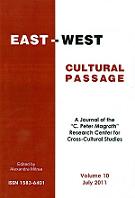“The Opposite of Disappearing”: Jewishness and Globality in Nicole Krauss’s Novels The History of Love and Great House
“The Opposite of Disappearing”: Jewishness and Globality in Nicole Krauss’s Novels The History of Love and Great House
Author(s): Corina SelejanSubject(s): Literary Texts
Published by: Editura Universitatii LUCIAN BLAGA din Sibiu
Keywords: Jewishness; cosmopolitanism; identity; hybridity; heteroglossia; dialogism; Bakhtin
Summary/Abstract: The paper addresses issues of cultural, ethnic and national identity as they emerge from Nicole Krauss’s two latest novels. They deal, among other things, with a hybrid and unstable Jewish identity in its evolution from the Holocaust and its aftermath into the contemporary global(ised) context. Central to almost all characters’ attempts to define themselves in ethnic, national and cultural terms are writing and literature. Thus, The History of Love is the title of both Krauss’s and one of her central characters’ books and in Great House, all of the four intermeshed narrative voices belong to either a writer or a passionate reader. Literature is seen as “an opportunity for compassion” (in Krauss’s own words) and thus as a ‘road’ to (moral) cosmopolitanism. Both novels emphasize, to different degrees, the globality of the post-Holocaust Jewish experience. The differences between The History of Love (which is the earlier novel of the two) and Great House are significant and unveil a disturbing progression: as the setting gets global, the tone becomes grave and the questions explicit: “What is a Jew without Jerusalem? How can you be a Jew without a nation?” (Great House 278). By operating with Bakhtin’s terminology (heteroglossia, dialogism, hybrid constructions), I intend to interrogate both the texts’ hybridity and the hybridity of identity that the texts thematise.
Journal: East-West Cultural Passage
- Issue Year: 11/2011
- Issue No: 1
- Page Range: 87-96
- Page Count: 10
- Language: English
- Content File-PDF

